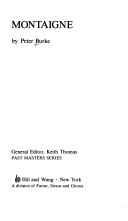Montaigne created a new literary genre - the essay - and his own essays, still compulsively readable today, had a widespread influence on thought and literature in the Renaissance and beyond. He puts forward unconventional views on a wide variety of subjects, including miracles, kings, animals, war, toleration, sex, and witches. A serene, ironic observer of the human comedy, Montaigne was intrigued by human diversity, and (unlike most of his contemporaries) prepared to take private life as seriously as public life. Montaigne has too often been treated as a 'modern' born out of his time. Peter Burke replaces him in his cultural context, and shows what Montaigne had in common with his contemporaries as well as how he differed from them. He describes the reactions of posterity to the Essays, which have appealed to a wide variety of writers and thinkers, from Bacon to Montesquieu, from Nietzsche to Levi-Strauss, and asks whether Montaigne can in any sense be considered our contemporary. This book is intended for students of Renaissance history and politics from A-level upwards; students of the history of the essay, Renaissance studies.
- ISBN10 0809014246
- ISBN13 9780809014248
- Publish Date 1 January 1982 (first published 1 October 1981)
- Publish Status Out of Stock
- Out of Print 2 October 2008
- Publish Country US
- Imprint Hill & Wang
- Edition American ed.
- Format Paperback (US Trade)
- Pages 81
- Language English
